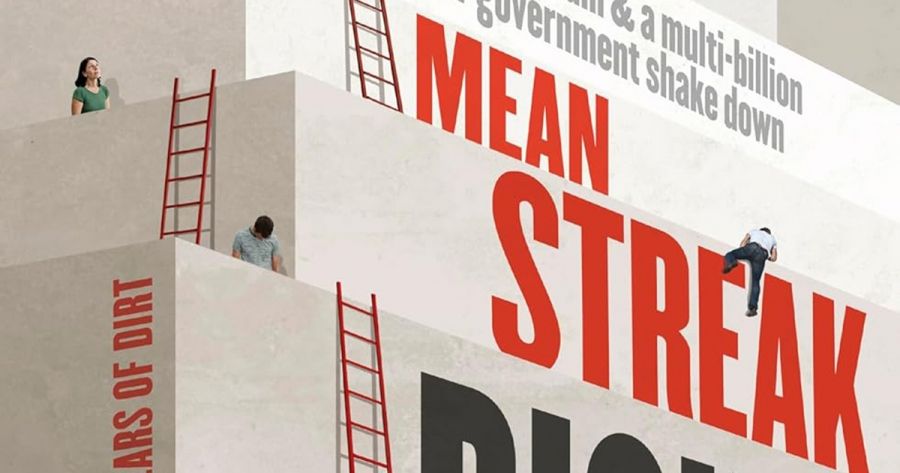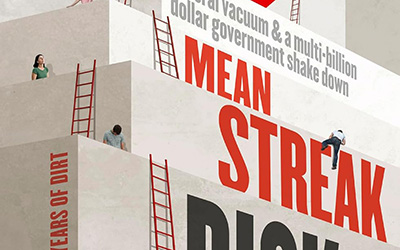
- Free Article: No
- Contents Category: Welfare
- Review Article: Yes
- Article Title: ‘Strengthening the integrity’
- Article Subtitle: Unmasking the mendacity of Robodebt
- Online Only: No
- Custom Highlight Text:
The colloquial term ‘robodebt’ had emerged online by early 2017. It is now used to refer to several iterations of mostly automated compliance programs targeting former and current social security recipients, overseen by the then federal Department of Human Services, which pursued alleged overpayments of social security moneys.
- Featured Image (400px * 250px):

- Alt Tag (Featured Image): Eve Vincent reviews ‘Mean Streak’ by Rick Morton
- Book 1 Title: Mean Streak
- Book 1 Biblio: Fourth Estate, $35.99 pb, 498 pp
- Book 1 Cover Small (400 x 600):

- Book 1 Cover (800 x 1200):

- Book 1 Readings Link: https://www.readings.com.au/product/9781460765807/mean-streak--rick-morton--2024--9781460765807#rac:jokjjzr6ly9m
Between 2015, when it was first piloted, and mid-2020, when it was finally terminated, alleged overpayments were pursued under different program names. Initially, this measure was nested under a broader program named Strengthening the Integrity of Welfare Payments; it was massively expanded in mid-2016 and became known as the Online Compliance Intervention (OCI); in 2017, the scheme continued under the moniker Employment Income Confirmation; in its last gasp, it was known as Check and Update Past Income.
 Scott Morrison, Washington DC, 2021 (Newscom/Alamy)
Scott Morrison, Washington DC, 2021 (Newscom/Alamy)
In Mean Streak, journalist Morton generates a set of new descriptions. The sterility of those benign-seeming program names masks the violence of Robodebt, and Morton’s first task is one of unmasking. This was a ‘shake down’, ‘extortion’, a ‘rapacious scheme’, a ‘spring-loaded trap’, an ‘eye-popping exercise in government loathing’, a ‘dog of a concept’; Robodebt’s victims were ‘scammed by their own government’, they were ‘bilked’ and they were ‘hunted’.
How Robodebt unfolded is the story Morton tells, blow by blow. Mendacity, incompetence, moral cowardice, and ambition all played a role, he shows. Morton reaches these conclusions via attention to the individual characters involved, their actions, and their highly consequential inaction. Mean Streak has been acquired for an ABC TV series, which makes sense given this attention to character development.
Morton explains essential features of Australia’s income support system. Receipt of benefits is subject to stringent eligibility criteria and conditions. Paid fortnightly, benefit receipt is effectively ‘reset’ each fortnight. That is, income support recipients are required to report any income they earn fortnightly to Centrelink. Based on that reporting, it is determined whether they are eligible for a full or part payment for that fortnight (or ineligible for any funds). While I was researching two other harsh welfare measures pursued by the former Coalition governments led by Malcolm Turnbull and Scott Morrison, one person casually expressed, ‘I got nothing this week.’ They elaborated, ‘On the off week, you can’t even manage. It’s real hard.’ Fortnight-to-fortnight is thus the technical, legal, and experiential reality of life within Australia’s welfare system.
The architects of Robodebt magicked away this reality. Using another anodyne phrase, Robodebt deployed an ‘income smoothing methodology’ to identify cases where social security moneys might have been overpaid. This data-matching exercise initially stretched back to the 2010-11 financial year. Annual Australian Tax Office data was averaged across Centrelink reporting fortnights, which produced a wildly inaccurate picture of a supposed discrepancy between benefits paid and those for which recipients were eligible.
There are two critical dimensions to grasp about Robodebt’s design and its undoing. First, income averaging is illegal according to the Social Security Act. Morton cleaves close to the Royal Commission into the Robodebt Scheme, chaired by Commissioner Catherine Holmes (the report into which was tabled in mid-2023). Morton meticulously details several critical moments between 2014 and 2019, when government legal teams established the scheme’s illegality in writing. This legal advice was known by key public servants involved in Robodebt’s design and execution and then either obfuscated, not shared and/or not acted upon by them. There were notable exceptions. People who raised concerns, though, were invariably treated as irritants. This advice was first delivered in November-December 2014 as the idea for the scheme took shape, propelled by the enthusiasm of then Minister for Human Services, Scott Morrison. The Royal Commission found that Morrison allowed Cabinet to be misled on the question of this scheme’s legality and the need for legislative change.
Second, it is important to appreciate the extraordinary reversal of the burden of proof. After a supposed discrepancy was identified, a letter was sent, advising the recipient of that discrepancy and the route to resolving it: the submission of often years-old evidence of fortnightly earnings in the affected period. During the first iteration of Robodebt, there was no phone number on these letters, a deliberate behavioural ‘nudge’ designed to direct the addressee online. If the addressee did not submit this evidence, a debt to the Commonwealth was raised. If this doesn’t sound menacing enough, consider that the Royal Commission heard many stories of people who never received the letter posted to them and first learned of their alleged debt when they were contacted by an external debt collector. Further, alleged debtors’ tax returns were garnished to ‘repay’ them.
Why did it happen? Even more compelling than the character sketches and the focus on the scheme’s unlawfulness is the portrait of a society that Morton offers.
Most obviously, Robodebt was fuelled by an intense animus towards people living in poverty. In fact, it is a notable feature of Robodebt that it targeted the most ‘deserving’ of the poor. Here I reference rather than endorse the pernicious nineteenth-century distinction that still has currency: Robodebt targeted those who undertook some waged work while on income support payments, or debts were raised in cases where people had transitioned from benefit receipt to waged work in an affected year. It turns out that ‘having a go’ – working and earning income – did not protect past and present welfare recipients from the Coalition government’s base contempt and suspicion.
Further, and I found this a most illuminating and devastating dimension of Mean Streak, Morton probes the chasm that lies between powerful politicians, insulated bureaucrats, and many journalists, on the one hand, and people who have turned to the welfare state at one moment of their life to catch or cushion them, on the other. Morton shows this to be a colossal failure of imagination on the part of the first group, who could not seem to grasp the reality of lives that involve irregular work or the fact that people move house, sometimes often, changing address. Unable or unwilling to imagine the reality of people’s messy lives, politicians, bureaucrats, and reporters also failed to grasp that the socially subjugated would not simply pay up when served with an opaque false debt notice if it reached them (although many people did). They failed to imagine that poor people would go online to find answers, to share stories, and to fight for justice. I am drawing here on the vocabulary of the anthropologist of bureaucracy, the late David Graeber: his work helps us to appreciate the atrophied imaginations and dearth of ‘interpretative labour’ on the part of the bureaucrats involved.
Morton’s post-mortem of Robodebt is a feat of both exposition and effect. The themes I identify above are explicitly discussed, but it is also through the writing not just in the writing that these themes emerge. Morton swears (a lot), he sweats (profusely), he is unduly self-critical; he is a feeling, enraged, deeply humane narrator. Diligence, curiosity, imagination, and the labour of interpretation are core to his undertaking, highlighting the absence of these qualities on the part of the powerful and in broader society. Ultimately, Mean Streak tells a story about ‘cold indifference’ and social distance by turning the temperature up: Morton’s prose emanates heat.


Comments powered by CComment